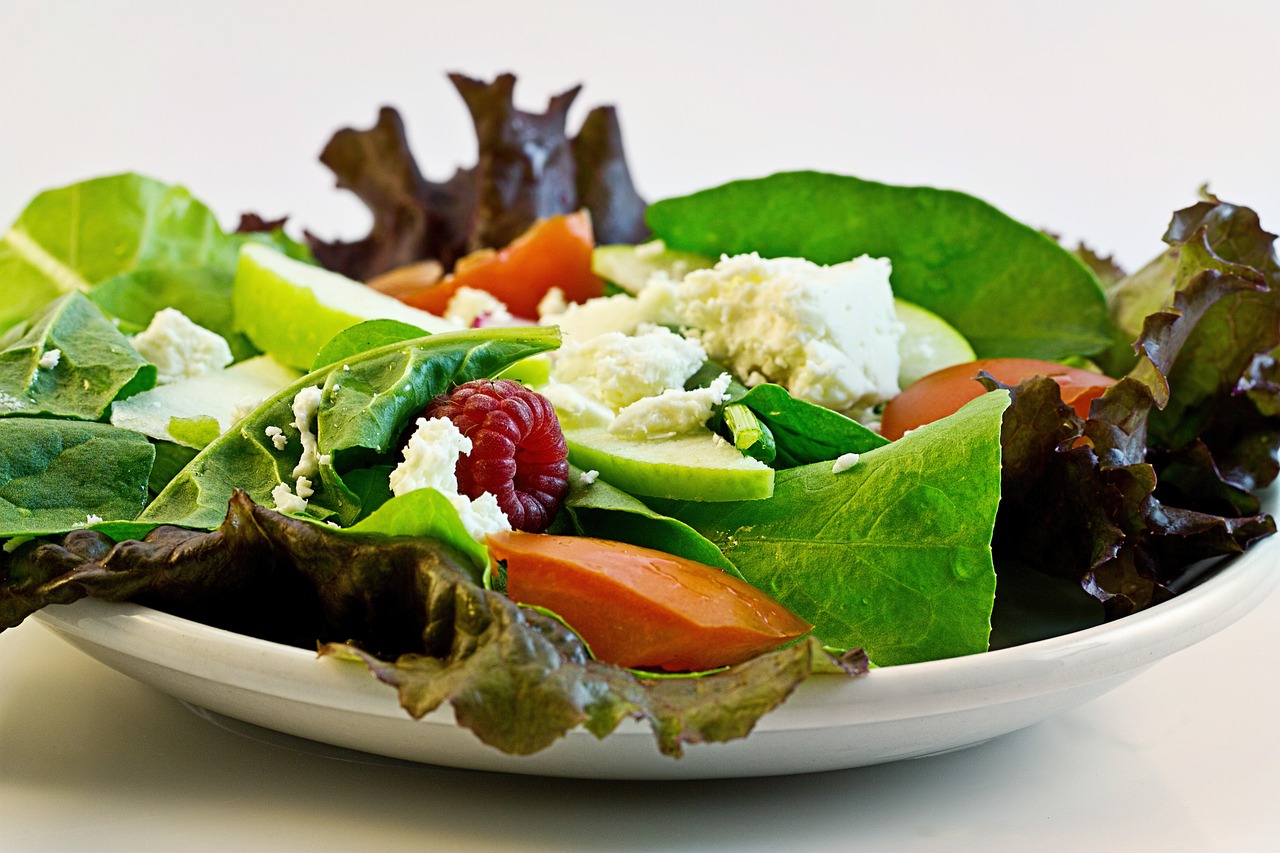Is Arugula Low FODMAP? Important Information!
One of the questions you might have while exploring the Low FODMAP dietary approach is – is arugula low FODMAP?
Arugula, also known as rocket or rucola, is not only a nutritious and delicious addition to salads, but it is also indeed considered low FODMAP.
So go ahead and enjoy arugula in your salads or as an ingredient in various culinary creations, knowing you’re making a gut-friendly choice. We tell you how to add arugula to your low FODMAP meals.
Is Arugula low in FODMAP?

What is Arugula?
Arugula, also known as rocket, is a popular leafy green vegetable packed with vitamins, minerals, and antioxidants. It’s a great addition to your salads or as a topping for your favorite dishes. But you might be wondering if arugula is a good option for those following a low FODMAP diet.
FODMAP Content of Arugula
Good news! Arugula is indeed considered low FODMAP. For those not familiar, FODMAPs are short-chain carbohydrates that can cause digestive distress in some people, particularly those with irritable bowel syndrome (IBS). The low FODMAP diet aims to reduce the intake of these types of carbohydrates to help alleviate symptoms.
Nutrition Content
Below is a nutrition table for arugula based on a serving size of 100 grams:
| Nutrient | Amount |
|---|---|
| Calories | 25 |
| Protein | 2.6 g |
| Carbohydrates | 3.6 g |
| Fiber | 1.6 g |
| Sugars | 2.0 g |
| Fat | 0.7 g |
| Vitamin A | 2373 IU |
| Vitamin C | 15 mg |
| Vitamin K | 108.6 mcg |
| Calcium | 160 mg |
And here is a table for Glucose, Fructose, and Excess Fructose content in arugula per serving suggestion:
| Sugar Type | Amount |
|---|---|
| Glucose | 1.1 g |
| Fructose | 0.9 g |
| Excess Fructose | 0.0 g |
Keep in mind that individual reactions to FODMAPs can vary, so pay close attention to how your body responds when incorporating arugula into your meals. You can easily include arugula in your low FODMAP diet by adding it to salads, sandwiches, or as a garnish for your favorite dishes. Enjoy the nutritional benefits and delicious taste of arugula without worrying about its FODMAP content!
Health Benefits of Arugula on a Low FODMAP Diet

With its distinctive peppery flavor, arugula is low in calories and carbohydrates while being rich in vitamins, minerals, and antioxidants.
Vitamins and Minerals
One of the main advantages of including arugula in your low FODMAP diet is its high levels of nutrients, such as vitamin K, vitamin A, vitamin C, and calcium.
These nutrients help to support healthy bones, skin, and immune system. Additionally, arugula contains antioxidants that can help to protect your body against cell damage and reduce inflammation.
Versatile
Apart from its nutritional benefits, arugula is also a versatile ingredient that can be easily incorporated into various dishes. Whether you choose to add it to your salads, sandwiches, or use it as a garnish, arugula provides a fresh and flavorful touch to your low FODMAP meals.
Is Low FODMAP
Moreover, arugula is a low FODMAP food, which means it is unlikely to cause any digestive discomfort for those with irritable bowel syndrome (IBS) or similar conditions. By including arugula in your diet, you can enjoy its tasty flavor and health benefits without the worry of triggering any unpleasant symptoms.
Related – Is Ghee Low FODMAP
How to Incorporate Arugula into Your Low FODMAP Diet

Below are a few ideas on how to include arugula in your meals.
Salads
Arugula makes a healthy and flavorful base for a low-FODMAP salad. Combine it with other low-FODMAP greens, such as spinach or kale, and add a variety of low-FODMAP vegetables, like bell peppers, cucumbers, or cherry tomatoes. Finish your salad with a drizzle of garlic-infused olive oil and a splash of vinegar or lemon juice for extra flavor.
Sandwiches and Wraps
Upgrade your regular sandwich or wrap it with a handful of arugula. It adds a peppery flavor and a little crunch to your turkey, chicken, or low-FODMAP vegetarian sandwiches. Ensure that the bread or wrap you use is compliant with the low FODMAP diet as well.
Pasta Dishes
Arugula can also be mixed into your favorite pasta dishes. Toss it into a warm pasta dish at the end of cooking, and it will wilt just enough to blend in with the other ingredients. Arugula works especially well with gluten-free spaghetti, lemon-infused olive oil, and grated Parmesan cheese for a simple yet satisfying meal.
Smoothies
For a nutrient boost in your morning smoothie, add a handful of arugula to the blender. It pairs well with low-FODMAP fruits, such as strawberries, blueberries, and pineapple. If you’re new to adding greens to your smoothies, start with a smaller amount and gradually increase it to your taste.
Garnishes and Sides
Sometimes the simplest options are the best. Arugula can be served as a side dish or used as a garnish for your low FODMAP main courses, such as grilled chicken or fish. Lightly dress it with olive oil, salt, and lemon juice for a fresh and flavorful side.
Potential Side Effects of Arugula Consumption

While arugula is generally well-tolerated, like any food, it may cause side effects in some individuals.
Digestive Discomfort
When consuming arugula, you might experience mild digestive discomfort, especially if you’re new to eating this vegetable. This can result in symptoms such as gas, bloating, or abdominal pain. To minimize the risk of these side effects, try gradually introducing arugula into your diet, giving your body time to adjust to it.
Thyroid Issues
As a cruciferous vegetable, arugula contains compounds called goitrogens, which can interfere with thyroid function in high amounts.
However, this is usually not a concern for those with healthy thyroid function, as you would need to consume a large quantity of arugula to experience these effects. If you have thyroid issues or are taking medications for thyroid health, it might be wise to discuss your arugula consumption with your healthcare provider.
Allergies
In some cases, you may experience an allergic reaction to arugula. This is relatively rare, but symptoms can include itching, swelling, hives, or difficulty breathing. If you suspect that you’re allergic to arugula, stop consuming it and consult with a doctor.
Cardiovascular Issues
Lastly, arugula can contain varying levels of nitrates, which can be a concern for some individuals, particularly those with cardiovascular conditions. High-nitrate vegetables might interfere with the body’s ability to process nitric oxide, affecting blood pressure regulation.
Although occasional arugula consumption is unlikely to pose a significant risk, it’s essential to maintain a balanced diet and consult with a healthcare professional if you have concerns about nitrate intake.
Alternatives for Arugula on a Low FODMAP Diet
Arugula, also known as rocket, is a member of the Brassicaceae family and is known for its peppery taste. It is great news for those following a Low FODMAP diet, as arugula is considered low FODMAP and is generally well-tolerated by people with IBS and other digestive disorders.
However, if you’re looking for alternatives to arugula, maybe for variety or due to personal preference, there are several other low FODMAP greens you can enjoy. Here are a few suggestions:
Spinach
An excellent low FODMAP alternative to arugula, spinach is versatile, mild, and packed with nutrients. Enjoy raw spinach in a salad or cooked in various dishes.
Kale
Known for its hearty texture and slightly bitter taste, kale is another suitable low FODMAP option. It works well in salads, sautéed as a side dish, or blended into smoothies.
Lettuce
There are many types of lettuce available, and most of them are low FODMAP. Romaine, butterhead, and iceberg lettuce are all suitable options for your salads and sandwiches.
Bok choy
A popular Asian vegetable, bok choy is low in FODMAPs and brings variety to your meals. You can stir-fry it, steam it, or add it to soups.
When you’re looking to add more greens to your low FODMAP diet, experimenting with these alternatives can help keep your meals varied and interesting. Remember to always double-check portion sizes and individual tolerances for these vegetables, as everyone’s experience may vary. Happy eating!
Frequently Asked Questions
What other greens can be consumed on a low FODMAP diet?
In addition to arugula, many leafy greens are suitable for a low FODMAP diet. Some of these options include spinach, kale, lettuce, chard, and collard greens.
These greens are not only low in FODMAPs but are also packed with nutrients that positively contribute to your overall health and well-being. Incorporating a variety of these greens into your meals can help you maintain the benefits of a low FODMAP diet without feeling restricted in your choices1.
Is arugula a good choice for IBS sufferers?
Yes, arugula is indeed a good choice for individuals with irritable bowel syndrome (IBS) who are following a low FODMAP diet.
Arugula, also known as rocket or roquette, is low in FODMAPs and generally well-tolerated by most people with IBS. Including arugula in your meals provides not only an excellent source of dietary fiber but also a range of vitamins, minerals, and antioxidants that support a healthy digestive system. So feel free to enjoy arugula as part of your IBS-friendly diet!
Conclusion – Is Arugula Low FODMAP
Yes, it is. Adding arugula to your low FODMAP diet not only enhances the flavor and variety of your meals but also provides essential nutrients to support your overall health and well-being.
So, go ahead and enjoy this wonderful leafy green in your favorite dishes, knowing that it’s a delightful and nutritious choice for your low FODMAP lifestyle.

Jane Porter is an architect that like many others, had her life significantly impacted by digestive problems for many year. Trying to find a solution to her digestive problem, she came across the low FODMAP diet, a scientifically-backed approach designed to alleviate symptoms associated with irritable bowel syndrome (IBS) and other digestive disorders.







